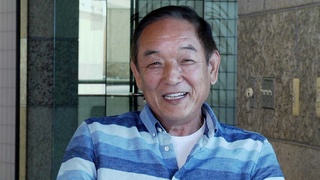Interviews
Her father bought her mother American clothes after she arrived from Japan
And so she arrived in Seattle. So I said, “What was the first thing that Dad did?” And she said, “Well the first thing he did was he took me to a department store so that – because he wanted me...you know, I was wearing a kimono and zori or geta,” and he wanted to buy her some American clothes and shoes, and so that’s how – and so the first – from the – you know – after she got off the ship and they went straight to the department store to get some American clothes and shoes, she said.
Date: August 7, 2018
Location: California, US
Interviewer: Sharon Yamato
Contributed by: Watase Media Arts Center, Japanese American National Museum
Explore More Videos

Support from Nikkei (Japanese)
Shin Issei – owner of izakaya (Japanese-style tavern) and kappo (small Japanese diner) restaurant, Honda-Ya

Immigration ship Brazil-maru (Japanese)
Shin Issei – owner of izakaya (Japanese-style tavern) and kappo (small Japanese diner) restaurant, Honda-Ya

Great grandfather Asato was a sumo wrestler
Okinawan American whose parents are from Peru.

Grandfather loved to tell her stories of her great-grandfather Arakaki
Okinawan American whose parents are from Peru.

Parents leaving Peru to move to California
Okinawan American whose parents are from Peru.

Grandfather migrating to Colombia
(b.1974) Japanese Colombian who currently resides in the United States

What made your parents decide to move to Brazil?
Professor of Law, University of Sao Paulo, Lawyer, Translator (b. 1948)

Moving to and living in Japan
Japanese American Creative designer living in Japan


Family interrelations between mother and father
(1926 - 2012) Scholar and professor of anthropology. Leader in the establishment of ethnic studies as an academic discipline

Going back to Hawaii
An expert researcher and scholar on Japanese immigrant clothing.

Picture brides and karifufu
An expert researcher and scholar on Japanese immigrant clothing.

Kibei schoolchildren in Hiroshima, Japan
(b.1913) Kibei from California who served in the MIS with Merrill’s Marauders during WWII.

Mother's immigration to U.S. as a treaty merchant
(b. 1927) Japanese American Nisei. Family voluntarily returned to Japan during WWII.

Chose to go back to Japan
(b.1924) Japanese Canadian Nisei. Interpreter for British Army in Japan after WWII. Active in Japanese Canadian community
